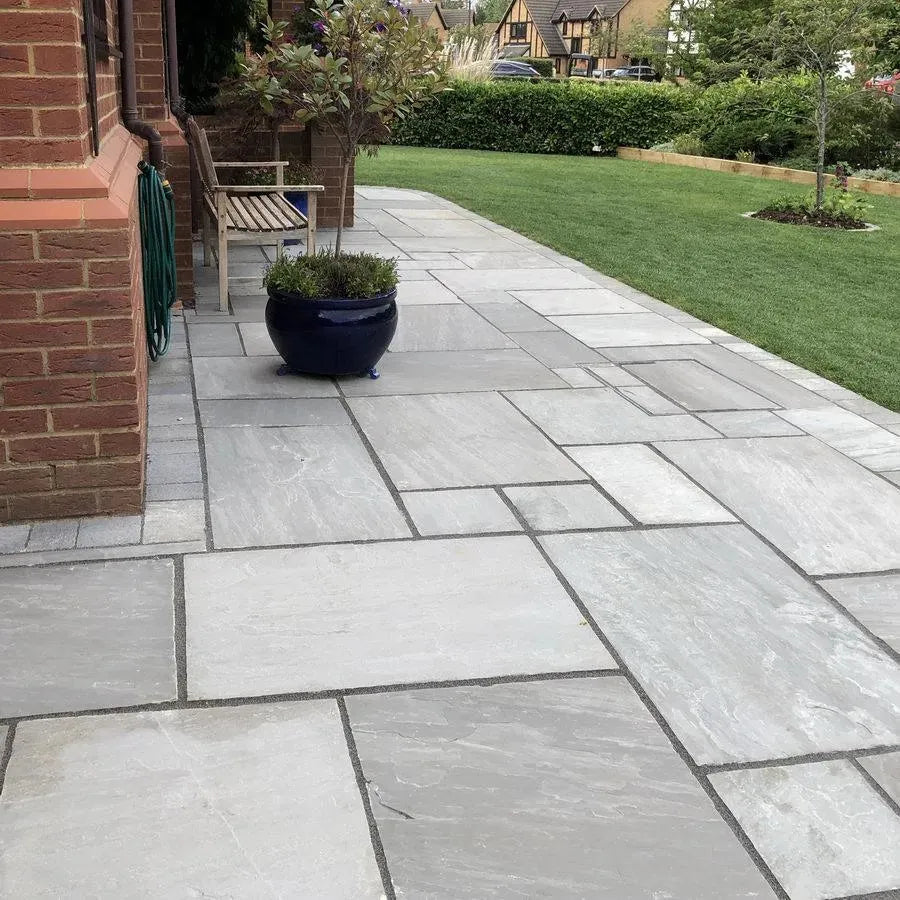When it comes to creating the perfect outdoor space, choosing the right paving slabs for your patio is a critical decision. For years, natural stone paving have been the classic choice for patios, offering timeless aesthetics and durability. However, the emergence of porcelain paving in recent years has sparked a debate – do they provide a viable alternative to traditional stone paving, or are they possibly an even better option?
In the modern era, external porcelain paving have evolved significantly. The new generation of textured porcelain paving now offers a combination of toughness, practicality, and convincing natural stone aesthetics. In this comprehensive comparison, we will examine the pros and cons of both stone and porcelain paving to help you make the best choice for your patio, path, or pool surround.
Table of Contents
The Pros of Natural stone paving
- Natural Stone Aesthetic: Natural stone paving create an entirely authentic and naturally appealing look, offering timeless charm to your outdoor space.
- Design Options for Natural Stone: Stone paving come in a wide range of shades, finishes, formats, and materials. Popular options include limestone, sandstone, slate, granite, travertine, and marble, each providing a unique visual character. It’s important to note that for outdoor installations, a minimum thickness of 20-40mm is recommended.
- Durability of Natural Stone: Natural stone is inherently hardwearing, with some varieties being denser and more robust than others.
- Practicality of Natural Stone: Stone paving generally feature textured surfaces that provide excellent grip underfoot, enhancing safety.
- Natural Stone Maintenance: Maintaining natural stone is relatively easy. Recommended maintenance includes sealing with a water-based protector after installation, regular sweeping, and periodic cleaning with a suitable detergent. Eco-friendly, water-based sealers and maintenance treatments like those from LTP’s ECOPROTEC range can help preserve the stone’s aesthetic and non-slip surface.
- Eco Credentials of Natural Stone: Stone is a completely natural green building material that requires minimal processing, such as sandstone paving, limestone paving, and granite paving. Additionally, it can be quarried sustainably and is recyclable. Reclaimed stone paving are also available for those who prioritize sustainability.
The Cons of Natural Stone Paving
Moisture and UV Resistance: Most natural stone is slightly porous and requires protection from water and stains to maintain its initial appearance. Stone can also be susceptible to damage from frost and can develop algae, moss, and black spots that make the surface slippery. UV rays can cause fading, particularly with darker stones. However, these issues can be addressed through appropriate sealing and restoration treatments.
The Pros of Porcelain Paving
- Moisture and UV Resistance: Most natural stone is slightly porous and requires protection from water and stains to maintain its initial appearance. Stone can also be susceptible to damage from frost and can develop algae, moss, and black spots that make the surface slippery. UV rays can cause fading, particularly with darker stones. However, these issues can be addressed through appropriate sealing and restoration treatments.
The Pros of Porcelain paving
- Porcelain Paving Aesthetics: High-quality porcelain paving can closely mimic the natural look of stone while adding a contemporary twist to your outdoor space. Options such as concrete-effect porcelain paving provide a realistic natural stone appearance.
- Porcelain Paving Design Options: External porcelain paving are available in various colors, finishes, and formats, making them versatile for hard landscaping projects. Stone-effect porcelain and wood-effect porcelain paving are particularly popular choices. For external installations, a minimum tile thickness of 20mm is recommended.
- Durability of Porcelain: Porcelain is exceptionally hardwearing, colorfast, and resistant to most stains, scratches, moisture, and frost.
- Practicalities of Porcelain paving: Textured porcelain paving offer excellent grip underfoot. Look for designs with an R11 anti-slip rating for enhanced safety.
- Maintenance of Porcelain: External porcelain paving do not require sealing and can benefit from pre-installation barrier treatments. Regular sweeping and periodic cleaning with a suitable detergent help prevent dirt and residue buildup. Eco-friendly, water-based sealers and maintenance treatments like those from LTP’s ECOPROTEC range can be used for upkeep.
- Eco Credentials of Porcelain: Porcelain paving are composed of clay, finely-ground sand, and feldspar, making them low in volatile organic compounds (VOCs). Their production generates minimal waste, and raw materials can potentially be recycled.
The Cons of External Porcelain Paving
- Staining During Installation: Porcelain can be susceptible to staining during installation, especially on surfaces with pronounced textures. Grout and resin may be challenging to remove from the face of the tile. Pre-treatment with products like ECOPROTEC Porcelain Tile Protector can help prevent this issue.
Choosing Between Porcelain and Natural stone paving & Flagstones
In summary, both stone and porcelain paving offer excellent options for outdoor spaces. Natural stone paving may require slightly more care after installation, while porcelain paving can be more susceptible to issues during installation. However, both of these challenges can be easily addressed by using the correct treatments, such as pre-installation barriers, sealers, or cleaners.
Ultimately, the choice between the two comes down to personal preference. Do you prefer the classic and authentic appeal of natural stone, or are you drawn to the contemporary alternative offered by porcelain paving? Your decision should align with your design vision and practical needs. Whether you opt for the real countryside or its modern counterpart, both choices can result in a stunning outdoor space. For further advice and inspiration, consider exploring our blog posts on using stone paving outside and how to choose porcelain or limestone paving slabs. To bring your vision to life, explore our wide range of paving slabs and wall tile collections.

